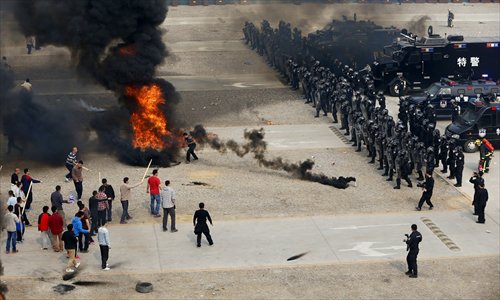HOME >> CHINA
Security stepped up in anti-terror efforts
By Jiang Jie Source:Global Times Published: 2014-6-4 0:43:02

Police officers holding shields and batons line up to control other participants pretending to be an angry mob during an anti-terrorism drill in Beijing on Friday. Photo: IC
China has stepped up security efforts to maintain stability, increasing police on the streets and seeking popular participation in anti-terrorism and crime tip-offs, after the launch of a nationwide campaign in late May.
A total of 22 specially-altered ambulances have been stationed at 22 key areas day and night in Beijing since June 1 to assist efforts to protect the capital, said the Red Cross Society of China (RCSC) Beijing Branch.
In a press release sent to the Global Times on Tuesday, the RCSC said that each ambulance has three medical staff and can transfer two to three injured people at once, double the normal capacity. Each ambulance is equipped with gas masks, fire extinguishers and shields.
Besides railway stations and Tiananmen Square, key areas include popular spots like the Sanlitun nightlife and shopping area and Dahongmen, where there are several major wholesale markets.
Police dogs have also joined routine patrols in densely-populated areas.
Wang Lei, an officer with the police dog training team, said that they have started training dogs to attack and contain suspects by biting. "One bite can cause bone fractures," Wang said, adding that the dogs are also trained to jump on cars to stop criminals, according to a Tuesday blog post from the Beijing Municipal Public Security Bureau.
Beijing is also keeping tighter control on long-distance buses carrying passengers to the city. Identity checks before leaving the station began in 2012, while a new rule has come into effect to prevent passengers from disembarking before buses arrive at the terminus to strengthen anti-terrorism, reported the Beijing News.
Several security guards and police officers were seen at the long distance bus exit at Sihui transport hub in Beijing. An unnamed guard told the Global Times that passengers will have their identities checked during ticket purchase and before they leave the station.
Two police cars and a temporary police station were found in the Sanlitun area along with an ambulance.
A medic, who would not give his name, said that 17 ambulances are stationed along the Third Ring Road to speed arrival of medical personnel and resources to the scene of any accident.
Pedestrians in Beijing told the Global Times they are not bothered by the increased police presence, and some said they feel safer. A tourist surnamed Lin said that she believed the visible presence could serve as a deterrent to any potential attack.
Armed police are also on patrol at Hangzhou International Airport in Zhejiang Province, while police officers and cadets in the Xinjiang Uyghur Autonomous Region are feeling pressured amid more patrols and intensive weapons drills, according to the South China Morning Post.
The Ministry of Public Security on Sunday announced that police across the country will also start a year-long operation to pool information for early identification of terrorist groups.
Awards of up to 500,000 yuan ($80,025) will be offered for tip-offs on terror crimes in Chengdu, Sichuan Province, according to a notice issued by local police on Monday. The notice came into effect in June and will last until May 31, 2017. Similar tip-off reward notices were also issued in regions such as Liaoning Province and Nanning, capital of Guangxi Zhuang Autonomous Region.
Newspaper headline: Enhanced police presence, emergency response teams on city streets
Posted in: Society